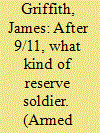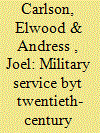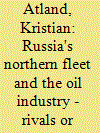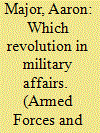|
|
|
Sort Order |
|
|
|
Items / Page
|
|
|
|
|
|
|
| Srl | Item |
| 1 |
ID:
085359


|
|
|
|
|
| Publication |
2009.
|
| Summary/Abstract |
Two concepts, Moskos's institutional-occupational orientations and Meyer and Allen's organizational commitment, were used to develop several hypotheses concerning relationships of soldiers' stated reasons for joining and staying in reserve military service to their stated career intentions and to perceived unit readiness. Survey data were obtained from first-term, junior-ranking enlisted Army National Guard soldiers nationwide at three time periods. Time periods corresponded to different phases of the Iraq conflict- before, during, and after the initial invasion. The number of soldiers at each time period equaled about 7,000 to 8,500. Results suggest material incentives may increase recruitment and retention, yet at the same time, such incentives may not enhance readiness. Rather, incentives fostering normative and affective commitments, such as joining and staying for camaraderie and service to country, were related both to self-reported career intentions and perceived unit readiness.
|
|
|
|
|
|
|
|
|
|
|
|
|
|
|
|
| 2 |
ID:
085364


|
|
|
|
|
| Publication |
2009.
|
| Summary/Abstract |
This article examines the effect of prior military service on hiring for entry-level jobs in a major metropolitan labor market. The research employs an audit method in which resumes differing only in the presentation of military experience versus civilian work experience are faxed in response to an advertised position. Results suggest that employers exhibit preferential treatment of black military veterans with transferable skills over black nonveterans. Veterans with traditional military experience in the combat arms do not experience preferential treatment by employers, regardless of racial/ethnic background. These findings suggest a possible mechanism generating the postmilitary employment benefit among blacks found in prior observational studies. A veteran premium in hiring may stem from the concentration of blacks in military occupational specialties with a high degree of civilian transferability, combined with employer preferences for military veterans with such work experience over their nonveteran peers.
|
|
|
|
|
|
|
|
|
|
|
|
|
|
|
|
| 3 |
ID:
085370


|
|
|
|
|
| Publication |
2009.
|
| Summary/Abstract |
In this article, the authors aim to apply well-known concepts of managerial work to the military. The concepts and methods used are derived from Henri Mintzberg, who paved the way in discovering the "nature of managerial work." The data are based on closely observing two commanding officers at Kabul International Airport, operated by the International Security Assistance Force. Those managers play different managerial roles, and the ability to develop three types of roles-informational, interpersonal, or decisional- depends on their hierarchical level, their own functional area, and the complex environment of the military compound. Compared to conventional managers, military managers during multinational deployments have to cope with specific features such as the importance of language and communication skills (information roles), boredom among the workforce (interpersonal roles), as well as suddenly occurring emergencies and multiple ("political") authority lines inside and outside the mission area (decisional roles).
|
|
|
|
|
|
|
|
|
|
|
|
|
|
|
|
| 4 |
ID:
085380


|
|
|
|
|
| Publication |
2009.
|
| Summary/Abstract |
A cohort perspective contrasting four historical generations of American men reveals sharp differences in the extent to which each generation served on active military duty, in the share of that service that occurred during wartime and in the battlefield ages from seventeen to twenty-four, in the resulting rates of combat-related deaths, and in certain features of selectivity with respect to military service-chiefly education. Service data from Defense Department sources combined with population data from computerized census files produce these military profiles of the Hard Timers, Good Warriors, Lucky Few, and Baby Boomers.
|
|
|
|
|
|
|
|
|
|
|
|
|
|
|
|
| 5 |
ID:
085377


|
|
|
|
|
| Publication |
2009.
|
| Summary/Abstract |
Described as one of the world's most promising new energy provinces, the European Arctic is no longer primarily seen as a military playground. Russia's approach to the region is increasingly governed by national economic interests rather than by national security interests. The development of offshore oil and gas fields, the construction of new pipelines and terminals, the increasing traffic of oil tankers to Western Europe and the United States, and the conversion of naval yards to civilian production represent both new challenges and new opportunities for the Russian Navy. Issues that were previously considered crucial to the country's national security have slowly but steadily been "desecuritized," and new patterns of civil-military relations have emerged. This article discusses the relationship between the Russian petroleum industry and the Northern Fleet and the interplay between Russian commercial and military interests in the post-cold war European Arctic.
|
|
|
|
|
|
|
|
|
|
|
|
|
|
|
|
| 6 |
ID:
085368


|
|
|
|
|
| Publication |
2009.
|
| Summary/Abstract |
Using data from 34,381 Air Force active-duty members, the current study examines active-duty members' perceptions of their spouse's or significant other's ability to cope with deployment of unknown length and adjust to demands of being an Air Force family. Active-duty members' perception of their spouse's ability to cope with deployment significantly varied by rank and time married, with 35 percent of junior enlisted and 30 percent of members married less than three years indicating their spouse would have a serious or very serious problem coping with deployment of unknown length. Protective factors-unit relationship quality, leadership effectiveness, and tangible social support from community members-were positively and significantly related to members' reports of spousal ability to adjust to Air Force family demands. The variance explained by these protective factors was highest for active-duty members who had been away from home for deployment or temporary duty for more than six months in the past twelve months.
|
|
|
|
|
|
|
|
|
|
|
|
|
|
|
|
| 7 |
ID:
085375


|
|
|
|
|
| Publication |
2009.
|
| Summary/Abstract |
Since the arrival of Secretary of Defense Rumsfeld, the discourse of American military strategy has been framed around a Revolution in Military Affairs (RMA). This article takes up the question of whether the RMA discourse represents a real strategic shift through an examination of the distribution of Defense Department spending on procurement across economic sectors and geographical space for the period 1990 to 2004. Detailed analysis of procurement data shows that the RMA builds on an earlier transformation in the United States' defense posture around the post-cold war disarmament rather than signal a new era for the military.
|
|
|
|
|
|
|
|
|
|
|
|
|
|
|
|
|
|
|
|
|